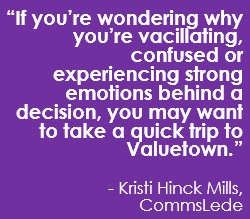
When clients and students ask me about decision making, I always ask if they’ve defined and articulated their core values, since I sincerely believe that the fastest and best way to make any smart business or personal decision begins with values. If you have a crystal-clear picture of what you (or your organization) deeply cares about (and also what you don’t), you can check your biases and speed up your decision process while also feeling confident in almost any choice.
Don’t get me wrong … sometimes even poor decisions can lead you in the right direction. But if you’re wondering why you’re vacillating, confused, or experiencing unusually strong emotions behind a decision, you may want to take a quick trip to Valuetown.
The Clarity of Values
In her book, “Values First,” author and Ph.D. Laura Eigel says, “Your values are your strategy. Use your values in your everyday life to remain focused and to center yourself – to ensure you aren’t getting distracted by a new thing or a new opportunity … Your values are your guide.” Eigel’s work offers a roadmap to formally define and articulate your core values, and her straightforward advice also holds true with organizations.
Once we’re clear about our core values, we can use them to discern between options or make a choice.
- You’re offered an exciting, well-paying, high-profile job supporting an unpredictable leader known for regularly putting his team in high-stress situations. You know one of your core values is peace. Easy choice.
- You’ve been offered a less-visible, somewhat-less-interesting role that’s double your current salary with an upward trajectory. Financial success is a core value for you. Another fairly easy choice.
- Your team’s budget was cut, and you have to choose between upgrading a new comms platform or hosting a team training session. “Supporting a culture of growth and development” is a core team value. Tough tradeoff is made.
Emotions ranging from excitement to anxiety to fear often accompany important decisions, and managing those feelings in the moment can be a challenge. Proactively filtering your options through your guiding values early in the decision making process can help you avoid getting swept up in the emotional spin.
When Values are In Conflict
Things get more difficult when values are in conflict, though. For example:
One of your personal core values is learning. Another is family. You’re offered an exciting promotion to a role that promises loads of learning opportunities and requires international travel for significant windows of time. What do you do? This is when you can get both curious and creative.
- Can you find a way to accept the role and work remotely?
- Can you find creative ways to make your limited family time more memorable, so the time you spend together feels more meaningful?
- Can your family travel with you? Or meet you on the road?
- Or can you meet your learning needs through other avenues outside of work?
The clearer your core values, the easier decision making can become, and the faster you can lean into creative thinking. And if a work or personal decision comes down to choosing between two core values, you’ll know that either way, your decision will be aligned with – and guided by – something you deeply care about, so you can rest more easily.
With more than two decades of communications experience spanning agencies, Fortune-100 organizations, non-profits and academia, Kristi Hinck Mills brings her passion for employee communications to CommsLede Consulting, where she delivers strategic solutions and executive coaching for her clients. Visit the CommsLede blog for more tips.



